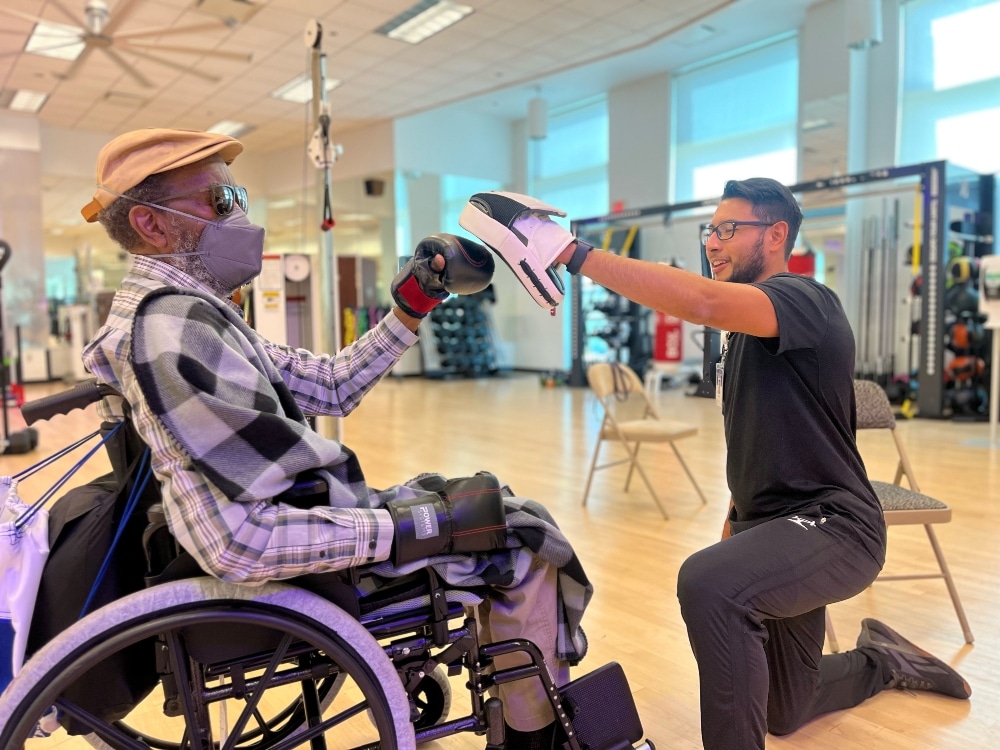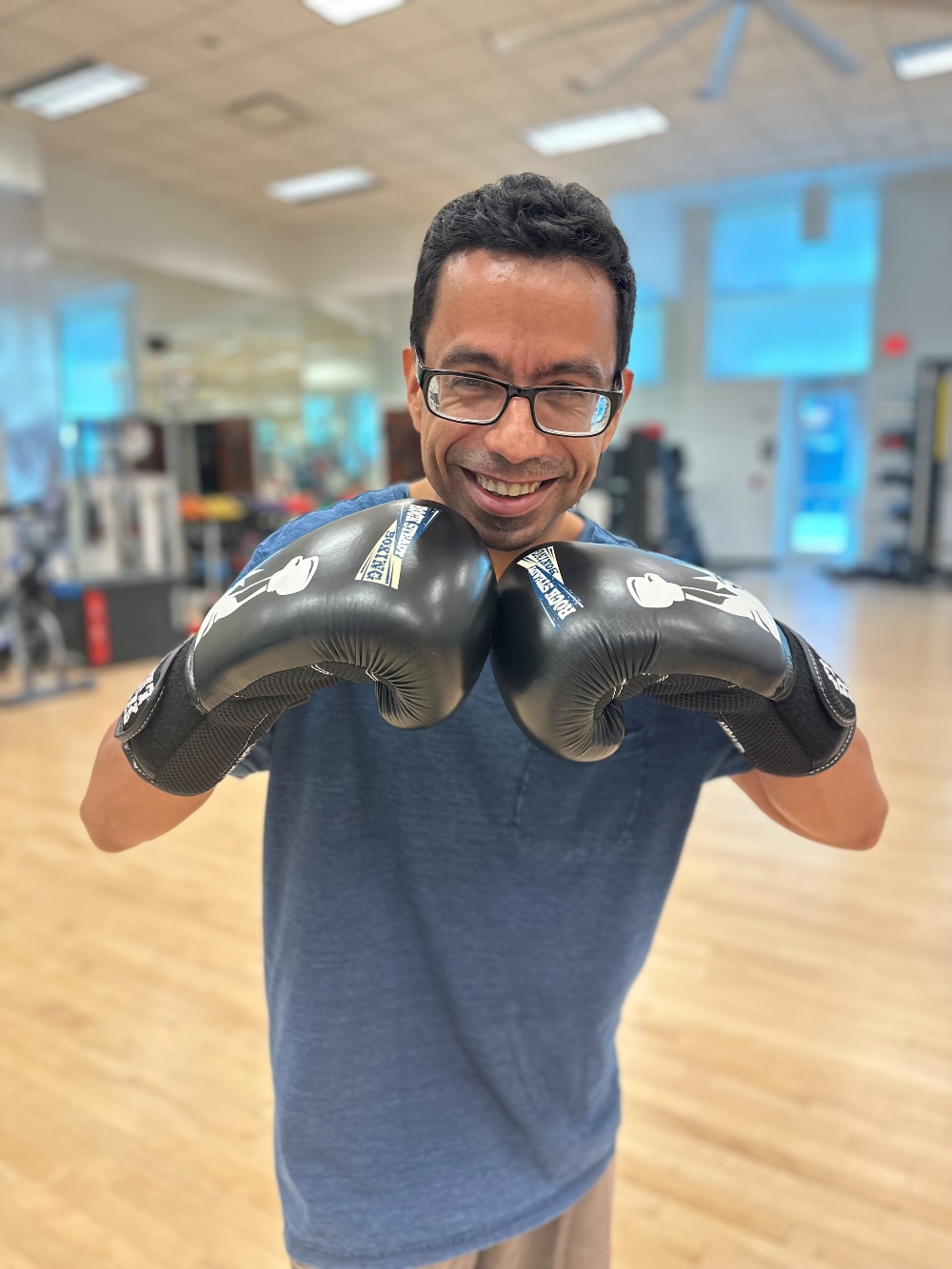Chris Smith, the vice president of finance and operations for the ECU Health Foundation, was working out at the ECU Health Wellness Center when the director pulled him aside and told him about the Rock Steady Boxing program – a non-contact, boxing-inspired fitness routine specifically created for patients with Parkinson’s disease and similar movement disorders.
“They were looking for help with starting up the program – equipment, training for a few coaches, that sort of thing,” Smith said. “I told him we’d take a look at how the Foundation could help, and as it turned out, we were able to provide them the funds they needed to get the program started.”
Parkinson’s disease is a neurological disorder that causes unintended or uncontrollable movements, such as shaking, stiffness and difficulty with balance and coordination. Symptoms worsen over time, causing difficulty with walking, talking or other daily activities. While there is no cure, physical activity can improve many symptoms of Parkinson’s disease, slow the progression of the disease process and improve patients’ quality of life.

First created in Indianapolis in 2006, Rock Steady Boxing is now an international nonprofit program with more than 840 certified affiliates. Now, ECU Health’s Wellness Center counts itself among those numbers because of the Foundation’s support.
Smith said it was gratifying to know that money given by donors was used in such a meaningful way.
“This demonstrates the impact of what our donors do for their friends and families in the region. It showed the tangible impact philanthropy has on the lives of people in eastern North Carolina.” Smith also had a personal connection to the program; his father had Parkinson’s. “He passed away right before the pandemic. He was doing rehab, but he could never get back on his feet.”
With those donor-provided funds, which covered the cost of coach training in Indianapolis and the necessary equipment, the ECU Health Wellness Center was able to establish a Rock Steady Boxing program in 2023. Two of the coaches trained for the program were Kiara Robins, the lead exercise specialist, and Cas Costa, an exercise physiologist II. More than 36,000 people live with Parkinson’s disease in North and South Carolina, and Costa highlighted the value of having this program in the area.
“I didn’t realize at first the impact it would have, and I didn’t know how few locations offered the class.” That’s true; the ECU Health Wellness Center is currently only one of three locations to offer the program in eastern North Carolina. As a result, Robins said that their class has grown quickly: “We started with just three or four members but now we’re up to ten or twelve. We have people come from Rocky Mount, Kinston, Grimesland, Snow Hill and Ayden looking to do the program. We’re steadily growing, and we’re seeing great results.”
Those results are measured through balance and gait tests, such as the Berg Balance test and the Get up and Go test. “Our first four participants have gone from high fall risks to medium or low risks,” Robins said. “Some couldn’t even complete components of the tests, but they now can.”
Justin Mendoza, one of the participants in the class and its youngest member, attested to the program’s positive effects. “They [the coaches] really put their heart into thinking of exercises. You have someone who has studied this and knows what you’re going through. I’ve improved in my strength and walking, and I don’t fall as often,” he said.
While some clients, like Mendoza, heard about the Greenville class when theirs shut down, others received referrals from their physical therapists or physicians. Dr. Temitope Lawal, an ECU Health movement disorder neurologist, is one of those doctors to refer patients to the program.
“Exercise slows the progression of Parkinson’s,” he said. “It’s an extrapolation of the saying, ‘if you don’t use it, you lose it.’ This program makes you accountable and asks you to move your muscles as much as you can.” Dr. Lawal also noted the social value of the program. “It’s an avenue for interaction with others who have Parkinson’s, so it’s like an informal support group.” Costa agreed: “The biggest benefit is the sense of community. It’s hard to go to a regular gym and know what to do. But here, everyone has Parkinson’s so there’s a level of comfort with the activities.”
That accessibility to specialized exercise programs is just one of the things that sets apart the ECU Health Wellness Center.
“The Wellness Center is more than a gym,” Robins said. “You have trained staff here, all with a degree in exercise and certified in one or more areas to better serve the population.” Costa also emphasized the value of specialty-trained staff. “We’re a wellness center, which is different from a gym. In a gym you can’t see a dietician or a lifestyle coach or go next door for a physical therapy appointment. We have a full-circle of wellness with staff trained to help patients with Parkinson’s, arthritis, orthopedic needs, cancer and other diagnoses.”
Both coaches acknowledged that collaboration is required to make Rock Steady Boxing and other programs successful.

“I’m working towards a Ph.D. in kinesiology, and in school we’re learning about the relationship between physicians and exercise physiologists,” said Costa. “Rock Steady Boxing is an example of that collaboration. ECU Health supporting this program helps us build relationships with the doctors and specialists in the network.”
This partnership provides access to valuable resources and complements the medications patients with Parkinson’s must take to combat the symptoms.
Membership is not required to participate in Rock Steady Boxing. “90 percent of our participants are non-members,” Robins said. Participants pay for eight sessions per month, but there’s also a drop-in rate for those who have less predictable schedules. Those who are unsure if they want to join can observe a class for free, and they can participate in the class on a month-to-month basis with no obligation.
Robins said the program has plans to continue its growth so it can better serve the region, and both she and Costa shared their appreciation to the Foundation for supporting the program.
“We’re grateful to have this program here in Greenville,” Robins said. “We’re still in the beginning stages, but we want to expand as much as we can and get more members. We want to encourage everyone with Parkinson’s to participate and to let them know we’re here to help as much as we can.” Mendoza championed the program and the coaches for their hard work: “I love the class. We have fun, and the coaches know what they’re doing. You don’t feel intimidated or self-conscious, and it gives you a sense of pride.”